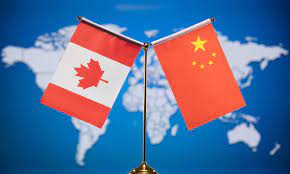In a new sign of tense relations, China has accused the Canadian government of “harping on human rights” and “aggressively lobbying” for the release of an alleged terrorist.
The criticism was levelled at Canada yesterday in the aftermath of a visit to Beijing by Canadian Foreign Affairs Minister Peter MacKay, who raised the case of Huseyin Celil, the Canadian citizen who was sentenced to life imprisonment on terrorism charges last month.
After his four-hour meeting on Monday with his Chinese counterpart, Mr. MacKay said he was confident that China had a much better understanding of Canada’s unhappiness over the treatment of Mr. Celil.
But China’s state-owned media, which act as a mouthpiece for the Chinese government, took a much different line yesterday as Mr. MacKay flew out of Beijing on his way to South Korea for the next stop in his Asian tour.
In their reports yesterday, the Chinese news media were hostile or indifferent to Mr. MacKay’s campaign for diplomatic access to Mr. Celil, who has been held incommunicado in a Chinese prison for almost a year.
“Sino-Canadian ties have soured since the Conservative Party took power in Canada last year,” said China Daily, the state-owned propaganda newspaper.
“The new administration has been harping on human rights and has differences with Beijing on a number of issues,” it said. “Canada has been aggressively lobbying for Celil’s release, citing consular protection, but China refuses to fall in line, saying the case is related to terrorism and Canada should not interfere in China’s internal affairs.”
The Conservative government has never publicly asked for Mr. Celil’s release from prison. It has merely asked for consular access to Mr. Celil, as required under international agreements, since China is obliged to allow Canada to have access to Canadian citizens in Chinese custody.
The state-owned news agency, Xinhua, said the Chinese Foreign Ministry did not even mention Mr. Celil’s name in its summary of the meeting between the Canadian and Chinese foreign ministers.
The news agency instead emphasized that Mr. MacKay had promised that Canada will “stick to the one-China policy and will not develop official ties with Taiwan,” something that Mr. MacKay did not mention in his press conference after his meetings in Beijing.
China has been concerned that a number of Conservative MPs have travelled to Taiwan and attended official Taiwan functions, in defiance of China’s view that Taiwan is a renegade province of China.
Another state-owned Chinese newspaper, People’s Daily, said there were some “sensitive issues” in the meetings between Mr. MacKay and Chinese officials, but it made no mention of Mr. Celil.
“His visit has brought about no apparent signs of immediate resolution of these issues,” the newspaper added.
The Chinese news media said repeatedly that China regarded the Celil case as an internal matter that had no connection to Canada.
Last week, the Chinese media were equally critical of Canada, charging that Canada was “shielding criminals” by allowing Mr. Celil and other Chinese fugitives to enter Canada.
The news media attacks on Canada are a sign that China is maintaining a stubbornly unyielding stand on the Celil case and is unlikely to offer any concessions.
Written by: Geoffrey York
Original Link: theglobeandmail.com/news/national/canada-harping-on-human-rights/article684182/


Recent Comments